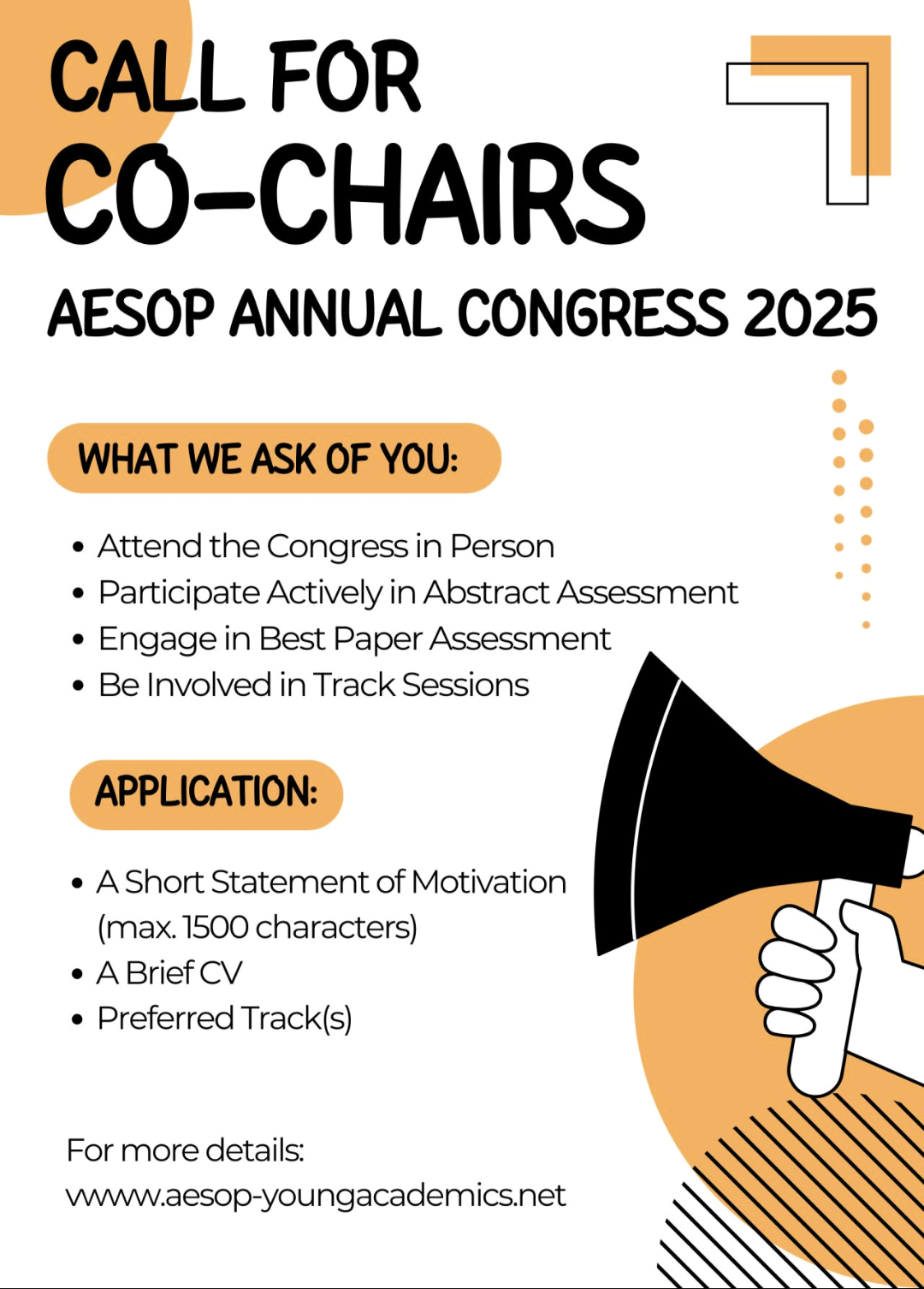We are excited to announce that the next AESOP Annual Congress will take place at Yıldız Technical University and Davutpaşa Campus in Istanbul, Turkey from July 7-11, 2025. The main theme of the Congress is “Planning as a Transformative Action in an Age of Planetary Crisis”. This year, we are once again inviting early career scholars to take on the role of Co-chairs for each of the 18 tracks.

Why Become a Co-Chair?
As a Co-chair, you will:
- Gain hands-on experience in the preparation and management of congress tracks, including abstract selection, best paper evaluation, and session organization.
- Enhance your moderation skills and broaden your networking opportunities with session presenters.
- Engage in in-depth discussions and contribute to shaping the track's content.
What We Ask of You:
- Attend the Congress in Person: Your presence is essential! Please only apply only if you can be on site.
- Participate Actively in Abstract Assessment: Evaluate and provide feedback on submitted abstracts.
- Engage in Best Paper Assessment: Help identify and recognize outstanding papers within your track.
- Be Involved in Track Sessions: Facilitate and moderate sessions to ensure a smooth operation of your track.
How to Apply:
Please submit the following materials to express your interest:
- A Short Statement of Motivation (max. 1500 characters): Include an overview of your primary research interests and relevant experience into the application form.
- A Brief CV: Highlight your academic background and any relevant experience and upload it on the application form.
- Preferred Track(s): Indicate your preferred one or more tracks for which you would like to serve as Co-chair on the application form.
Additional Information:
- Registration Fee: Co-chairs are required to pay the standard registration fee. There will be no exceptional reduction of the registration fee for Co-chairs. Please note that this position is a voluntary role.
- Eligibility: Early career researchers (pre-PhD) and young academics with strong connections to the track themes will be prioritized. If spots remain, more experienced young academics are also encouraged to apply.
We look forward to your application and to working with you in shaping a successful AESOP Congress 2025! The deadline for applications is until Friday, 13 September 2024, 10 PM CET.
The deadline for applications has now been extended Saturday 21st September 2024, 10PM CET. The Congress website with more information and the track descriptions will soon be available.

The 18 tracks are:
- Postgrowth : Cities and urbanism beyond growth; Degrowth; Social equity; Ecological balance
- Law : Law as a catalyst for change; Legal frameworks for planetary transformation and just transitions
- Mobility : Inclusive, accessible, sustainable, innovative forms of urban mobility systems
- Governance : Engaging communities; Institutional aspects; Collaborative responses in and beyond boundaries
- Environment and Climate : Navigating climate challenges; Adaptation and mitigation strategies
- Culture, and Heritage : Risks and threats on cultural landscapes
- Inclusion : Planning responses to shifting demographic landscape; Vulnerable populations; Political, natural and anthropogenic triggers of migration
- Education and Skills : Planning education responses to social, economic, and environmental challenges; Innovative pedagogical approaches, knowledge and skills
- Urban Futures : Changing mindset; Novel and innovative narratives for a equitable, and just future
- Theories : Critical approaches to planning theory and practice
- Emerging Technologies : Cutting-Edge Technologies, Gamification, Digital twins, Big data, AI/GeoAI, Machine learning in urban planning; Pros and Cons of technological advancements
- Disaster-Resilient Planning : Planning for the Unexpected; Disaster preparedness, management and recovery; Disaster-oriented urban solutions; Resilience and risk mitigation
- Housing and Shelter : Planning for affordable housing; New models of living; Homelessness; Shelter for refuges and vulnerable population
- Ethics and Values : Upholding ethics in an age of crisis; Socio-spatial justice; Ethics of care in planning
- Actors and Property Markets : Actors and property markets in shaping cities; Bottom-up/Top-down actions
- Food : Planning for just and sustainable food systems; Food security; Food safety
- Public Space : Transformative power of public spaces; Reclaiming the commons and commoning; Urban political movements; Grassroots; Places of encounter; Public realm; Virtual space
- Tourism : Overtourism; Commodification of culture and nature; Responsible tourism; Regenerative tourism; Reparative tourism

